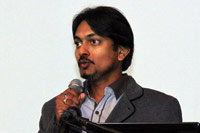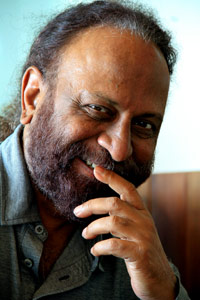Looking to history for a timely message

A scene from Bhavatharna
Young film-maker Daevinda Kongahage tasted international success with his debut film Bhavatharna (Crossing Sansara), when the film won the Award for the Best Film at the 2015 Delhi International Film Festival in December.
On Wednesday, the grand premiere of Bhavatharna was held at the National Film Corporation Cinema Theatre in Colombo, attended by a gathering of politicians, artistes and film makers.
Also present was a delegation of international artistes including Zaklina Ostir from Montenegro and Martine Malalai Zikria from Afghanistan.
Speaking on the occasion, Daevinda Kongahage said simply that he has always spoken in cinematic language which is better than any other language.
The success of a filmmaker lies in his ability to change the world, which is divided – speaking Sinhala, Tamil or English – through cinematic language, he said.
Bhavatharna revolves around an untold chapter of history during the Kandyan kingdom, under the Nayakkar king Keerthi Sri Rajasingha’s rule, where a few aristocrats with the involvement of the most venerated monks in the land, attempted a coup against the king.
Ironically, the plot is hatched within a monastery, in spite of the immense generosity that the king had displayed for the welfare of temples, monasteries and monks in the Kandyan kingdom.
The story unfolds in the form of a vague dream that Pulasthi – the main character experiences from time to time. Puzzled, Pulasthi decides to dig into the meaning of his nightmares taking the audience with him to the final conclusion.
The experienced cast of Bhavatharna includes Sajeev Rajaputhra, Malani Fonseka, Kanchana Kodithuwakku, Shriyantha Mendis, Mahendra Perera, Chandika Nanayakkkara, Roshan Pilapitiya, Udayanthi Kulathunga, Sanketh Wickramage, Roshan Ravindra, Asela Jayakodi, Srimal Wedisingha, Dharshana Dharmaraj, Nihal Fernando, Thidas Wickramasingha, Ganendree Kongahage, Luckshan Wattuhewa and Buddhika Lokuketiya.
The film was inspired by Prof. Lorna Devaraja’s book ‘The Kandyan Kingdom’.

Young director Daevinda speaks at the premiere. Pic by Indika Handuwala
As lead actor Sajeev Rajaputhra said in his welcome address, the premiere was not merely thescreening of Bhavatharna but marks the beginning of Indo- Lanka collaboration towards greater cultural exchanges.
The unveiling of the 2016 Delhi International Film Festival also took place at the Bhavatharna premiere when the President of the Delhi International Film Festival (DIFF) Ramkishore Parcha who graced the occasion announced DIFF 2016 here in Colombo, in appreciation of Daevinda’s achievement. Sri Lanka was declared the Tourism Partner for DIFF 2016.
The occasion also saw the exchange of the MoU to establish a new film festival in Sri Lanka – the Ceylon International Film Festival.
The Social Circle of India, headed by Sushma Parcha- the organising body of the Delhi International Film Festival handed over the franchise licence to the Social Circle of Sri Lanka to hold the Ceylon International Film Festival annually in Sri Lanka.
Addressing the ceremony, President DIFF Ramkishore Parcha said, Bhavatharna winning the award at DIFF was particularly significant in strengthening Indo-Lanka relations.
“We consider this as a historical achievement not just for Daevinda but also for the entire nation, especially to the new generation film-makers of Sri Lanka,” he said, inviting Daevinda to step into Indian cinema for his future films.
Several awards were presented, including the Life Time Achievement Award granted by the Delhi Government and DIFF to Indian Film Director, Shri Ketan Mehta.
President Maithripala Sirisena presented the award to Mehta and was in turn presented with a special award by the Indian Government in appreciation of strengthening the close relations between Indian and Sri Lanka.
Bhavatharna’s Producer, Mavathagama S.R. Weerasingha’s contribution to Sri Lankan cinema was also recognised with a token of appreciation during the event.
Among the invitees were many artistes, authors and theatre veterans. Speaking to the Sunday Times, veteran film director, dramatist and playwright Namel Weeramuni was frank in his praise for Bhavatharna.
“I would call it a brilliant film. The movie had so many layers to it. There was a lot of symbolism and I particularly like the manner in which he weaved the past and the present in the movie.”
Award-winning journalist and lyricist Dr. Ajantha Ranasinghe too commented that it was a brilliant film, if a little complicated for some.
“It is a cinematic film. There are so many things that had made it a cinematic film and I was so surprised to see this film so sophisticated in terms of costumes, camera, dialogue, music and the performance of the actors/actresses.
President’s Counsel Hemantha Warnakulasuriya said all Sri Lankans can be proud of Daevinda’s achievement. This is one of the most magnificent experiences I have had as a cinema-goer for the last 50 years.
I believe it will go as a classic film of the world cinema in future. I hope Sri Lankan artistes and others will support Daevinda’s initiative to talk to us in the language of cinema.”
Brave subject for maiden film- Ketan Mehta  Ketan Mehta Renowned Film/Documentary and TV Director, Ketan Mehta who has created many internationally acclaimed films since 1981, starting with Bhavni Bhavai and later films like Mirch Masala, Maya Memsaab, Mangal Pandey, Sadar and Manjhi, has carved his own niche in the film industry. In an interview with the Sunday Times, Mehta who came down to Sri Lanka for the premiere of Bhavatharna shared his views about Daevinda’s film. “It is an ambitious film that deals with a very contemporary subject not just for Sri Lanka but for the world – the interaction between politics and religion discussed here is a very important issue that the world needs to look at,” he said. Commending Daevinda’s bravery in taking up the subject of politics and religion in his maiden film, Mehta hopes that the film will start a new wave in Lankan cinema and inspire others to look at cinema differently. Expressing his thoughts about the Sri Lankan film industry, Mehta said it is still an industry trying to balance commerce and creativity. “Cinema is changing so fast that it is necessary to have film makers who are trained in the medium and who understand the medium better,” he adds. What is needed are institutes that train students in cinema; events like the Ceylon Film Festival, which will create a platform for international film makers to interact with Lankan artistes; and for more adventurous and ambitious film makers like Daevinda, he said. |


